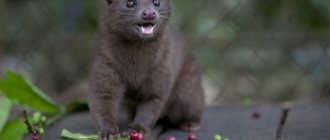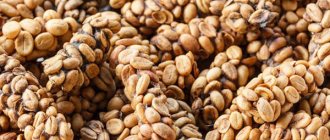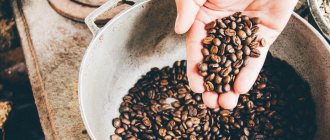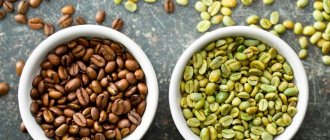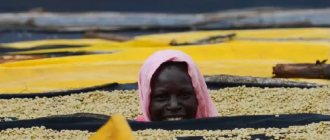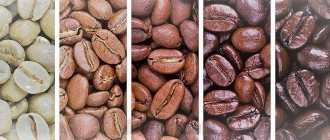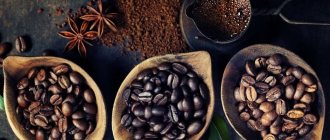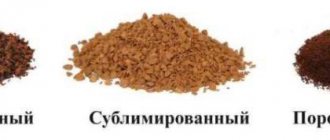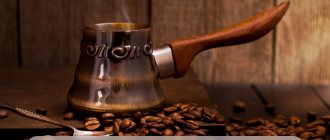20.04.2021 12:00
2305
Every day around the world, millions of people drink coffee. This is an amazing drink that gives a person energy and vigor. Caffeine, which is part of coffee, helps cope with fatigue and drowsiness. In addition, it is great for intimate conversations and is a wonderful gift for any holiday.
Today there are a huge number of coffee varieties known. Black Ivory (from English - black tusk) is considered one of the most expensive varieties of coffee. The secret of the drink lies in the unique way coffee beans are processed - they pass through the digestive system of an elephant! In this article we will look at how this unusual type of coffee was born, the technology and features of its production, as well as its taste characteristics.
The history of the creation of an exotic drink
The idea of creating Black Ivory coffee belongs to Canadian Blake Dinkin. In the process of coming up with a new way to obtain coffee beans, Blake considered and discarded many options. Having rethought the process of obtaining beans, he decided to create a type of coffee whose production would not contradict nature. So, he settled on the idea of processing grains by Asian elephants. The reason for this was the fact that it is the stomach acid of the elephant that can destroy the protein that causes coffee bitterness. Blake was so carried away by his idea that he himself repeatedly took part in the preparatory process of grain processing.
Black Ivory coffee production was founded on the territory of a Thai reserve. Already in 2012, the first Black Ivory harvest was obtained, which amounted to approximately 70 kg. The new type of coffee was highly appreciated by true gourmets and soon became popular among buyers. It should be noted that only wealthy people can afford this product, since the price of this coffee is quite high. A cup of this drink will cost $50, and the cost of a kilogram of coffee beans is about $1,200. This price is due to the fact that the coffee is produced on a modest scale, as Dinkin adheres to the idea of humane treatment of elephants. Moreover, up to 10% of profits from the sale of coffee is directed to supporting and protecting elephants.
Black Ivory coffee cannot be found in the supermarket. It can only be tried in a few resorts in the Maldives and Thailand.
Cost of the most expensive coffee in the world
According to preliminary data from the German company Statista, the global coffee market is expected to exceed $36.3 billion in 2022. And your habits are one of the reasons for this growth.
Lately, coffee shops of various formats have been opening everywhere in big and small cities. If before there were not so many of them, now there are almost as many of them as doner stalls. Moreover, coffee shops have not only become a space where you can order an invigorating drink and go on about your business. Now these are places for dating, business meetings, friendly gatherings and other events.
Previously, the concept of a coffee shop as a place for social interaction was common only in Italy, Greece, Austria and the Middle East, but now it has captured the whole world and continues to actively gain momentum.
However, let’s return to the most expensive varieties of coffee in the world, which not every coffee shop dares to put on the shelves.
Technology and production features
The coffee production process occurs in several stages. To begin with, the elephants are fed rice porridge, to which Thai Arabica beans are added. In order for the finished coffee to have certain taste characteristics, elephants are fed various delicacies - bananas, sugar canes, etc. All these ingredients are digested in the elephant's stomach for 15-30 hours, after which the processed grains are released naturally. Further along the plantation, the manure is collected, kneaded, and coffee beans are extracted from it. The final step in coffee production is washing and drying the coffee beans and then roasting them.
Obtaining coffee beans is a very labor-intensive and costly process, because in order to get 1 kg of coffee, you need to feed an elephant about 35 kg of Thai Arabica beans, which are very expensive. Such a huge number of grains used is due to the fact that during the processing process, some of them break or deteriorate, and some are lost in the grass.
Kopi Luwak
The expensive variety is prepared from the droppings of the palm marten or, as the locals also call it, musang. It lives in the forests of South Asia, on the islands of Java and Sumatra and often visits plantations. The rare animal feeds on mixed food, including coffee berries.
During the day, the marten eats up to a kilogram of grains, choosing ripe and tasty ones. Almost all food is digested in the intestines of the musang; no more than a tenth of the fruit comes out. Coffee in animal droppings is contained in the form of whole beans, without a soft shell.
To obtain a drink from marten excrement, farmers do the following:
- Low bushes of the Arabica coffee variety are grown on plantations;
- Every day they walk around the plantings and collect musang droppings;
- The feces are thoroughly washed in plenty of water, separating the preserved fruits;
- The grains are dried and roasted.
You need a kilogram of coffee berries to obtain 50 g of the finished product. That's why Kopi Luwak is so expensive - it costs $1,000 per kg.
In addition, martens create an elite drink only 6 months a year; the rest of the time they are busy breeding. It is also necessary to feed the animals kept on the farm with meat and other products. After the Kopi Luwak production season, the animals are released into the wild.
The stomachs of musangs contain special enzymes that give the drink a unique taste and smell. After roasting, coffee becomes slightly bitter, with a chocolate-caramel flavor.
Taste characteristics of coffee
The unusual method of processing grains gives the finished drink a unique, inimitable taste and aroma. Since coffee beans are digested in the elephant's stomach along with various fruits and plants, the resulting drink acquires a fruity and earthy aroma that is so prized by gourmets. Thanks to elephant stomach acid, which affects Arabica beans, coffee has a smooth, rich taste without the inherent bitterness. At the same time, its characteristic sourness is not lost. Therefore, the taste characteristics of this coffee captivate everyone from the first sip.
Thus, although the processing of Black Ivory coffee beans is unattractive, this type of coffee is still the most elite and expensive in the world.
Who is the Luwak animal?
The official name of these cute little ones is musangs or palm martens.
Curious
And infinitely cute
These animals simply adore ripe coffee berries. After they ingest the coffee cherries, the pulp surrounding the coffee beans themselves is digested in their stomach, and the beans are passed unchanged during bowel movements (excuse me for such details). After this, people collect the valuable cargo, wash it and dry it. We hasten to assure you that there is no expected unpleasant odor after these procedures.
Valuable musang excrement before washing
The animal is especially valued for the fact that while in its gastrointestinal tract, coffee beans are fermented in a special way, due to which they lose the bitterness characteristic of coffee. And the taste of coffee becomes sour.
Luwak coffee beans after washing
They can even fry it right on the farm.
Luwak coffee beans after roasting
There is a legend about how people first learned the unique properties of Luwak coffee. A misfortune happened to one poor family: wild Masangs (or Tsiwengs) ate the entire harvest of ripe coffee beans for sale. The family was very sad, but then they noticed animal excrement, and in it there were undigested grains. Out of desperation, these beans were washed, fried and passed off as regular coffee. Imagine their surprise when its taste turned out to be simply delicious!
Today, producing Luwak coffee is a complex and expensive process. Wild animals are caught and placed on a farm. They produce a special enzyme only 6 months a year, so the rest of the time they are fed regular food, usually vegetables and fruits. When the time comes, all other food is removed from their diet and they are fed exclusively coffee fruits. Since feeding animals is quite expensive, they are often simply caught in the right season, and after coffee production is released to be captured the following year. In addition, it will not be possible to breed them on a farm: these animals do not breed in captivity.
We saw farms producing Luwak coffee in Vietnam and Bali, and everywhere there was a lot of pity for the animals: such living machines operated by humans.
A cramped animal hole on a farm
By the way, we heard that they began to produce coffee from elephant and even bird excrement. The process is approximately the same as with musangs, but the volumes, of course, are several times greater. We have not seen such coffee in Vietnam, but they say that it is as tasty as luwak. If this is so, maybe soon furry animals will stop being tortured on farms? Still, one elephant can produce 100 times more delicious coffee than a small rodent.
Elite Vietnamese coffee drink - Luwak from the droppings of the Musang animal
The secret is that musang loves to eat coffee berries.
Indonesian Luwak coffee helps produce a certain type of marten called musang. Their habitat covers many regions of Southeast and South Asia. All gourmets agree that it is not a shame to serve this kind of coffee from Vietnam to the king. The production volume is small and does not exceed several hundred kilograms per year.
Coffee fruits are the favorite food of Malayan martens. They are very picky eaters; they will never eat green grains, but will choose the ripest and most delicious ones. In a day, a marten can eat about 900–1000 g of grains, more than 90% of which will be digested in the intestines of the animals, and only 5–10% will come out in its original form, but without pulp.
It is interesting that grains are selected from the feces of females only for 6 months, and the rest of the time “girls” do not produce an odorous enzyme. The collected grains are thoroughly washed, dried and fried using special technology. Details of the production and processing of raw materials are kept secret, but manufacturers promise purity and high quality of the finished product. The drink made from it has an elegant bouquet of flavors of sweet caramel, delicate vanilla and bitter dark chocolate.
Today they are trying to produce this coffee on an industrial scale. However, this drink differs from the one made naturally. Apparently, in captivity, animals are not so generous with enzymes.
Watch this video on YouTube
Third place - Blue Mountains of Jamaica
The third in our ranking is a coffee variety called Blue Mountain from beautiful Jamaica. The price of these coffee beans ranges from $600 to $900 per kilogram. The island of Jamaica is, of course, a tourist area; the famous mountain in the center of the island gives it a special mystique. The majestic and mysterious blue mountain - Blue Mountain. It is at the foot of this mountain that coffee beans grow, which are used in the industry of one of the most famous brands - Jamaica Blue Mountain. The drink has a very interesting taste, which combines sweetness, sourness and slight bitterness. The nutty aftertaste of this type of coffee lasts for more than an hour and a half. Due to the fact that the growing area of these trees is limited, the export of these coffee beans is accordingly very small. An interesting fact is that this is the only coffee that is transported in barrels.
Separately, I would like to highlight the record holders of our rating - these are the two most expensive coffees from the litter.
Other high value coffees
- Coffee Yauco Selecto. This type of coffee is obtained in the Caribbean, from Arabica beans. Coffee trees are grown at an altitude of 100 meters above sea level, where there is an excellent climate for their growth and rich harvest. It is not passed through the bodies of animals, so coffee has a significantly lower cost - $50 per kilogram.
- Starbucks. This drink with this name appeared quite recently in 2004. Introduced to Rwanda by Starbucks. This drink has its own distinctive aroma and aftertaste. When drinking this coffee, you feel a slight sourness with a different bouquet of spices. The cost of a kilogram of grains is 50-60 dollars.
- Blue Mountain. This type of coffee is produced in the city of Walenford, Jamaica. A distinctive feature of the variety is the absence of bitterness and mild taste; it is very popular among the Japanese population. This variety is produced traditionally. The cost starts from $100 per kilogram and above.
Having considered the prices, production principles and taste characteristics of each expensive coffee, we can note that the most expensive varieties are the Kopi Luwak, Chon and Black Ivory brands. They have the same production principle, but from different manufacturers. It takes a lot of work to produce the product by passing grains through the stomach of an animal. Both of these types of coffee are popular only among the rich and affluent segments of the population.
Special taste
Judging by the descriptions of coffee lovers, coffee from the litter has a special taste: rich, with light caramel and chocolate notes. It is called the “drink of the gods” and the most delicious coffee in the world. It cannot be ruled out that people who paid such a lot of money to brew the kind of coffee that the civet “made” are simply deluding themselves that they have tried something extraordinary.
Luwak coffee, which is amazingly expensive, is often made artificially by adding a special set of flavors to regular coffee. A true gourmet will always distinguish a fake from the original drink and they say that fake coffee does not stand next to the real thing. There is a more interesting way of making Kopi Luwak coffee: ordinary beans are fermented using the civet enzyme, which is obtained chemically, to obtain a special flavor. In this case, the drink will also have a less intense taste than the one that passed through the civet’s gastrointestinal tract, although only Luwak connoisseurs will be able to notice this.
https://youtube.com/watch?v=dAygDyuqyWA
Finding original beans is not easy. “Wild” plantations, where grains are extracted from civet cat shit, are found only in Indonesia, where there is a very high probability of purchasing a fake in tourist areas. There are several plantations in Bali, but they only cooperate with wholesale buyers and companies that produce coffee on an industrial scale, and do not sell their products to tourists.
Many people who have purchased Luwak claim that rumors about its unusual taste are quite exaggerated. However, it is impossible not to feel pleasure if you drink the most expensive drink in the world, especially if it is Luwak coffee from Vietnam.
Commemoration of the “special” deceased:
There is a misconception that on days of special remembrance of the dead, the Church also prays for those people who independently passed away, that is, for suicides. Of course, this is not true: there are simply no days when the Church would pray for the lives of those who died without permission.
Where this belief came from and what its basis is is very easy to understand. There is probably no more terrible grief than when someone close to you passes away in this way. And I want to find consolation in prayer for such a person and I really want to come up with some reason in connection with which this prayer would still be allowed in the Church. But there is no such reason. You can't even light a candle for them.
But there are two points here: if we are talking about a person who was mentally ill, and this is confirmed by relevant medical documents, then he may not be charged with what he did, since people with certain diagnoses can commit suicide in a state of insanity, or a paralyzed disease of the will, when there is no strength to resist either the action of dark forces, or some kind of stress, or a state of depression. In such cases, the question of the possibility of a person’s funeral service is submitted to a special diocesan commission for consideration.
()
«»»»»»»»»»»»»»»»»»»»»»»»»»»»»»»»»
If we know that a person was involved in some dark activity in his life, for example, he was a sorcerer, we should not remember him - there is no need to take on such a terrible cross. If a person was some kind of notorious villain, scoundrel, murderer, then you need to look at your specific strengths. Are you ready to take on this cross? Because even if you write a note, you will somehow take this cross upon yourself. The remarkable Athonite ascetic, Hieroschemamonk Ephraim Katunaksky, who literally lived the Liturgy, performed it every day for many, many years, decades, spoke about his experience of praying for his brother - a sorcerer and warlock. Each time, for this prayer, the elder received, as he put it, a slap on the head or a slap on the head, and he realized that he could not do this. When his brother died and naturally stopped practicing magic, Hieroschemamonk Ephraim slowly began to remember him again and felt that he could already do it. There is such an experience, and perhaps it would also be worth looking back at.
Top articles: 13 most famous ghosts of Moscow
How to pray and what to order in Church?
Funeral prayer is a Christian duty, a duty of love. After all, the deceased themselves cannot change anything in their lives, but our prayer can change something in their current afterlife and their fate in eternity, until the moment of the Last Judgment. How and to what extent, we do not know, but as a matter of love for them, we pray for them.
«»»»»»»
«»»»»»»
«»»»»»»
«»»»»»»
How is coffee made?
Kopi Luwak (better known as wild civet) has a special composition of gastric juice. It is this substance that breaks down the substances contained in coffee beans, giving the future drink a special taste. The grains pass through the gastrointestinal tract virtually undamaged. The taste of kopi Luwak coffee is particularly rich.
Animals do not eat all coffee beans. They choose those that have a sweet taste. This also explains why the finished Luwak coffee drink is so delicious.
Local farmers collect excrement and grains. This process is quite labor-intensive. After all, first the feces must be washed with plenty of water, and then thoroughly dried in the sun.
Coffee can also be made from elephant feces. Only they eat coffee beans. True, the musangs themselves feast on them, and the elephants have to mix grains into their food.
Plot for a prophetic dream
On the night of Radonitsa, deceased parents or other relatives may come in a dream to tell you about your future.
To have such a prophetic dream, you need to go to the cemetery, bow and say:
«»»»»»»
Sayings and signs for Radonitsa
“They plow on Radonitsa before lunch, cry at lunch, and jump in the evening.”
«»»»»»»
“The songs about Maslenitsa are fun, and even more fun are the ones about Radonitsa.”
«»»»»»»
“Merry Maslenitsa is a shameless unfortunate drunkard, and revelry Radonitsa is a friend of bright joy.”
«»»»»»»
“If you don’t treat the honor and honor of your late parent on Radunitsa, no one in the next world will remember you, won’t treat you, won’t make you happy.”
«»»»»»»
If it rains on Tuesday on Radonitsa, they said: “The Mother of God will carry water with a yoke.”
«»»»»»»»»»»»»»»»»»»»»»»»»»»»»»»»»»»»»»»»»»»»»»»»»»»»»»»»»»»»»»»»»»»»»»»»»»»»»»»»»»»»
It is necessary to know and remember that the Lord first of all hears and accepts not prayer as a form where one thing follows another, and all the words stand in their places, but the prayer that comes from our heart.
Therefore, in addition to the established prayer rites, we can pray in our own words, about the simplest things: we can ask the Lord to forgive our deceased relative or friend all his sins that he committed here on earth, voluntary and involuntary, and to grant His mercy and His Heavenly Kingdoms.
How much does Vietnamese Luwak coffee cost?
Today in Asia, many packs are sold with the image of the Musang animal (the one that produces expensive grains) on the packaging. The cost of such packs starts from $2 per 500 grams. But we hasten to assure you that there are no more than 1-5% of real Luwak grains in such packs, and maybe not at all. Often, artificially fermented coffee is sold in packs under the guise of Luwak coffee, which has nothing in common with cute animals.
Usually Luwak coffee is mixed with Robusta and sold. The higher the content of luwak grains in a pack, the more expensive it will be. The price of pure Kopi Luwak coffee beans in Vietnam is about $ 1000
. And the cost of 1 cup of Luwak coffee in Europe can reach
$ 90
!
The price of Luwak coffee in Russia today reaches 3,700 rubles per 100 grams.
or 24″800 per 1 kg. We quote these prices from a specialized website that sells this particular type of coffee in Russia luwak.rf.
Video about real Luwak coffee from Indonesia:
We bought these packs in Vietnam and for only $2, most likely they do not contain real Luwak coffee beans, but the coffee is incredibly tasty:
High-quality coffee is not the cheapest pleasure. Therefore, a product that is sold at a low price does not inspire confidence, since it is most often a counterfeit or made from low-quality raw materials. However, the prices for coffee made from animal feces surprise and bewilder the average population of the planet. Only a few can afford this exclusive product.
These are such exotic varieties of coffee that not everyone will dare to try them.
However, it roughly looks like this:
- Terra Nera from palm civet feces. The cost of 1000 g is impressive and reaches a value of more than 20 thousand dollars. It is sold only in one of the stores in the capital of Great Britain in exclusive packaging made of special thin silver paper.
- Black Ivory is a drink made from elephant dung. The cost of such coffee is more than $1,100 per 1 kg.
- Luwak is a coffee made from animal feces from Vietnam. Not everyone can afford elite Vietnamese coffee, since 1 kg of roasted raw material called Luwak costs around 250 – 1200 dollars. You can try it in very expensive restaurants or purchase it in the country of its production.
There are also many other expensive, but less popular varieties of coffee.

